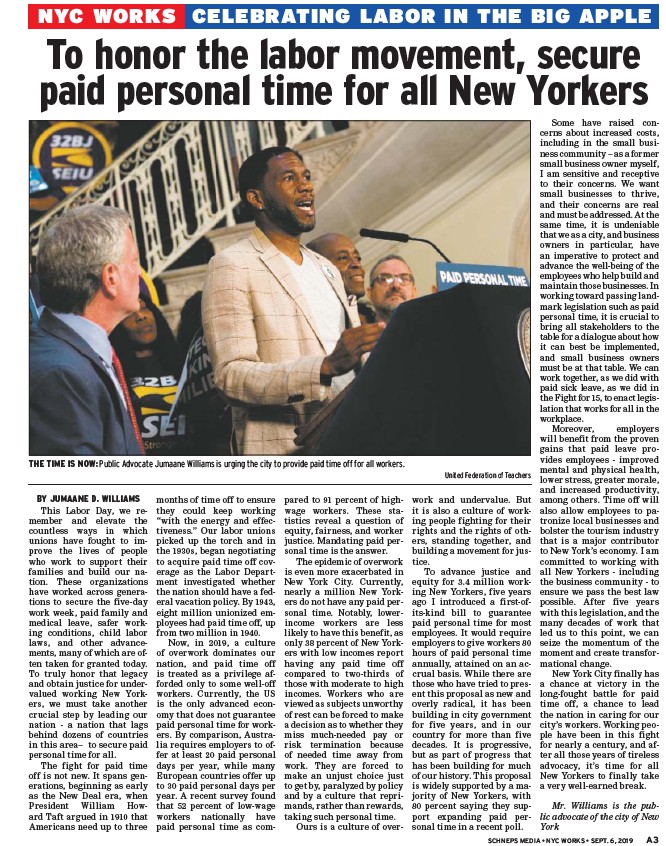
������������������ ��������������������������������������������������������������������
To honor the labor movement, secure
paid personal time for all New Yorkers
SCHNEPS MEDIA • NYC WORKS • SEPT. 6, 2019 A3
BY JUMAANE D. WILLIAMS
This Labor Day, we remember
and elevate the
countless ways in which
unions have fought to improve
the lives of people
who work to support their
families and build our nation.
These organizations
have worked across generations
to secure the five-day
work week, paid family and
medical leave, safer working
conditions, child labor
laws, and other advancements,
many of which are often
taken for granted today.
To truly honor that legacy
and obtain justice for undervalued
working New Yorkers,
we must take another
crucial step by leading our
nation - a nation that lags
behind dozens of countries
in this area– to secure paid
personal time for all.
The fight for paid time
off is not new. It spans generations,
beginning as early
as the New Deal era, when
President William Howard
Taft argued in 1910 that
Americans need up to three
months of time off to ensure
they could keep working
“with the energy and effectiveness.”
Our labor unions
picked up the torch and in
the 1930s, began negotiating
to acquire paid time off coverage
as the Labor Department
investigated whether
the nation should have a federal
vacation policy. By 1943,
eight million unionized employees
had paid time off, up
from two million in 1940.
Now, in 2019, a culture
of overwork dominates our
nation, and paid time off
is treated as a privilege afforded
only to some well-off
workers. Currently, the US
is the only advanced economy
that does not guarantee
paid personal time for workers.
By comparison, Australia
requires employers to offer
at least 20 paid personal
days per year, while many
European countries offer up
to 30 paid personal days per
year. A recent survey found
that 52 percent of low-wage
workers nationally have
paid personal time as compared
to 91 percent of highwage
workers. These statistics
reveal a question of
equity, fairness, and worker
justice. Mandating paid personal
time is the answer.
The epidemic of overwork
is even more exacerbated in
New York City. Currently,
nearly a million New Yorkers
do not have any paid personal
time. Notably, lowerincome
workers are less
likely to have this benefit, as
only 38 percent of New Yorkers
with low incomes report
having any paid time off
compared to two-thirds of
those with moderate to high
incomes. Workers who are
viewed as subjects unworthy
of rest can be forced to make
a decision as to whether they
miss much-needed pay or
risk termination because
of needed time away from
work. They are forced to
make an unjust choice just
to get by, paralyzed by policy
and by a culture that reprimands,
rather than rewards,
taking such personal time.
Ours is a culture of overwork
and undervalue. But
it is also a culture of working
people fighting for their
rights and the rights of others,
standing together, and
building a movement for justice.
To advance justice and
equity for 3.4 million working
New Yorkers, five years
ago I introduced a first-ofits
kind bill to guarantee
paid personal time for most
employees. It would require
employers to give workers 80
hours of paid personal time
annually, attained on an accrual
basis. While there are
those who have tried to present
this proposal as new and
overly radical, it has been
building in city government
for five years, and in our
country for more than five
decades. It is progressive,
but as part of progress that
has been building for much
of our history. This proposal
is widely supported by a majority
of New Yorkers, with
80 percent saying they support
expanding paid personal
time in a recent poll.
Some have raised concerns
about increased costs,
including in the small business
community – as a former
small business owner myself,
I am sensitive and receptive
to their concerns. We want
small businesses to thrive,
and their concerns are real
and must be addressed. At the
same time, it is undeniable
that we as a city, and business
owners in particular, have
an imperative to protect and
advance the well-being of the
employees who help build and
maintain those businesses. In
working toward passing landmark
legislation such as paid
personal time, it is crucial to
bring all stakeholders to the
table for a dialogue about how
it can best be implemented,
and small business owners
must be at that table. We can
work together, as we did with
paid sick leave, as we did in
the Fight for 15, to enact legislation
that works for all in the
workplace.
Moreover, employers
will benefit from the proven
gains that paid leave provides
employees - improved
mental and physical health,
lower stress, greater morale,
and increased productivity,
among others. Time off will
also allow employees to patronize
local businesses and
bolster the tourism industry
that is a major contributor
to New York’s economy. I am
committed to working with
all New Yorkers - including
the business community - to
ensure we pass the best law
possible. After five years
with this legislation, and the
many decades of work that
led us to this point, we can
seize the momentum of the
moment and create transformational
change.
New York City finally has
a chance at victory in the
long-fought battle for paid
time off, a chance to lead
the nation in caring for our
city’s workers. Working people
have been in this fight
for nearly a century, and after
all those years of tireless
advocacy, it’s time for all
New Yorkers to finally take
a very well-earned break.
Mr. Williams is the public
advocate of the city of New
York
THE TIME IS NOW: Public Advocate Jumaane Williams is urging the city to provide paid time off for all workers.
United Federation of Teachers